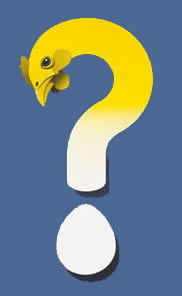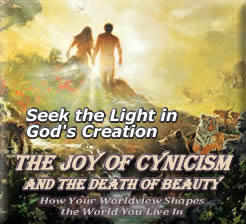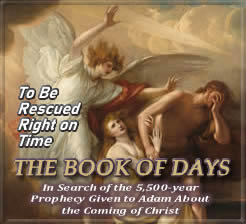Egg-sasperating Questions
On the Nature of Chickens and Falling Trees
As long as I can remember, I’ve always been intrigued by questions of how and why things work the way they do. Why is the sky blue? How do birds fly? What is time? Where did I come from? Who is God? You know, all the usual questions. And considering the how and the why of things, what’s the point of it all and where does it lead in the end. And I’m quite sure that like all parents before them, mine couldn’t wait till I’d stop prodding them for answers. Fortunately for me (and them) I was very happy to find an ever-present resource in my pursuit of knowledge … books, books, and more books. I can still remember perusing the book catalogs that we received in grade school, filled with all the books we could purchase through the mail. To me, these books offered a window into everything I longed to know about, and like a child looking forward to Christmas morning, I’d check off each and every book I wanted to read. Then, just like that blessed holiday morn, the day I received my package of books, I’d rip it open and lavish over its contents, reading every one from cover to cover.
Naturally, though, the books I had access to, which were written for mere children, could never provide me with all the answers that I was seeking, any more than my parents could at that tender age. Still they did provide me with enough answers that I came to believe early in life that many of the answers I was looking for were attainable, if only I continued to seek them out. I was particularly struck by the way that books could impart a lifetime—if not many lifetimes—of wisdom to the reader that was but willing to invest his or her time and energy into studying them. To that degree, one would say I had become an unrepentant believer in the written word, and in the process—without ever realizing what it meant to be one—I became an unabashed rationalist, completely sold out on the possibilities of the objective nature of reality. And from then until now, I can safely say that for every question I’ve ever asked I believe there exists a correspondent answer, like a hand to every glove, like a fingerprint to every finger, like a solution to every equation. I became convinced, in fact, that in the very question itself lies the answer. In other words, I came to see a tautological relationship between any question and its answer, as if they were mystically linked in the mind of God from which I had already come to conceive as being the source of all knowledge.
That said, imagine my surprise as an adult, when, after spending years acquiring so many apparently sound answers to satisfy my questions, I was confronted with a kind of question I never even considered to be valid in the first place. Yet, with a perfectly straight face, someone would ask me such silly questions as: “Which came first the chicken or the egg?” Or even more absurd: “If a tree falls in the forest and no one is there to hear it, does it make a sound?” As if those who were asking these questions were providing some sort of public service in the name of objectivity and fairness by pointing out the paradoxical nature of reality. But to me these questions were clearly intended to undermine a genuine quest for knowledge, not to uphold it or augment it. Far from establishing an honest and fair-minded approach to getting at the truth, the framing of questions in this way only seemed to me to be an underhanded method designed to confuse and demoralize anyone who dared to think that there really were valid answers to the most important questions in life.
Story Continues Below
To hear Kent talk about the little-known biblical prophecy, which speaks of the 5,500-year chronology from Adam to Christ, with Zen Garcia, the host of the Internet talk show Secrets Revealed, CLICK BELOW.
Story Continues From Above
After all, anyone with half a brain can see that when asking, “Which came first: The chicken or the egg?” the real crux of the matter is not what anyone can actually prove, because no one was around to witness the truth about such a thing; instead, the answer one gives simply reveals his or her pre-existing frame of reference. In other words, if a person is prone to believe that the chicken came first it usually means that they believe in the written testimony of the biblical record of Genesis, which states that God created the fowls of the Earth prior to the laying of the first chicken egg. On the other hand, if a person is prone to believe that the egg came before the chicken it probably means that they believe that evolution provided the mechanism that lead to the genetic mutations required to produce some kind of proto-chicken prior to the existence of chickens as we know them today. Likewise, you would do just as well to ask the same question in biblical terms, as in, “Which came first: Eve or Eve’s mother’s ovum?” Naturally, when one frames the question this way, one cannot possibly escape the theological implications. What’s more, one is driven not so much toward picking an answer to this riddle as much as one is forced to reveal his or her position of either accepting or rejecting the revelation of Scripture. Much in the same way, one is forced to decide whether or not to believe what The Bible says about the birth of Christ. Forget about chickens or falling trees. The real conundrum that haunts mankind is: “Which came first Jesus or Joseph’s sperm?” Upon closer inspection, questions about chickens and falling trees are merely poor imitations in terms of these larger mysteries regarding God’s creation of Adam and Eve prior to the formation of a fertilized ovum in a pre-Adamic human womb, or the creation of a fertilized ovum in the womb of Mary apart from the human element of her natural-born husband, Joseph.
So apart from all the theological implications of such debates, the question of which comes first actually has no real answer in terms of right or wrong. Bottom line: It’s really a trick question after all. The purpose in asking such questions is not to discover the correct answer but to reveal what a person believes about the nature of the Universe. In other words, when somebody challenges you to answer the hypothetical question of which came first, their underlying motive is not so much to elicit an answer that is, by its very nature, unprovable, but to reveal an a priori mindset, which is, in my view, the exact opposite of why an honest person asks a question in the first place. I mean, seriously, what other reason is there to ask a question if not to arrive at a genuine place of “knowing” something about what you’re inquiring about?
I believe the same thing can be said about the question of whether or not a tree falling in the forest makes a sound even though no one is there to hear it. In the first place, this question strikes me as absurd, considering that humans are not the only creatures that have eardrums. Am I to assume that because there are no humans in the forest at the time, there are no animals in the forest to hear the sound of a falling tree? Are the folks poising such questions really so snide in their opinion of the supremacy of mankind that only human eardrums constitute the final say in such a riddle? Am I the only person to notice this obvious inconsistency with such a supposedly clever question as this, one that has for so long stumped so many people? Really? And if one were to respond by saying that, just for the sake of argument, let’s pretend that in this hypothetical forest there are not going to be any animals, I would again have to ask them: Are you posing this imaginary scenario because you’re really interested in understanding the truth about the world we live in or are you, instead, only interested in mental gymnastics as a means unto themselves? Therefore, with a perversely straight face, they insist that they really are concerned with arriving at the truth, and with that they proceed with their next line of argument.
Returning our attention to the falling tree, then, here is what we are told. Naturally, when it comes to the question of whether the falling tree makes a sound, they freely admit that, yes, according to the laws of physics, when two objects collide, like a tree and the ground, there is, as is to be expected, the formation of sound waves, which even in the absence of living eardrums could still be detected by, say, a tape recorder. This is what they will accept as the scientific definition of sound, one which every physics professor the world over would agree is correct and true. All well and good, they say, but—and here one has a very substantial but with which to contend—there still remains the flip-side of the same coin. There is still, they say, the matter of the psychological nature of sound: Without the presence of a functioning brain as the receptacle of said sound waves, there is “no completion of the circuit,” as it were. In other words, they insist: Without the receiver, it cannot be proven that there was a transmission. This they describe as the psychological definition of sound, and to further bolster this view, they cite that even without external stimuli the brain can be induced to “perceive” sound through purely psychological means via external sources such as drugs or internal sources such as schizophrenia. In short, based on this line of reasoning, they have you coming and going. On one hand, they have to admit that when a tree falls it makes a sound; on the other hand, however, they insist that because sound can also be induced apart from its physical component that this undermines the possibility that the sound of a falling tree can be definitively proven. Either way, they are able to neatly avoid answering the question in a way that would undermine their a priori position. In essence, they have “won” by way of a circular argument; round and round they go, like a dog chasing its own tail, totally unconcerned with the sheer incongruity of its effort.
What a pity; and what a tragedy for anyone who lives with such wishy-washy people. Imagine the look on a child’s face when they ask one of their parents: “Do you love me?” Then imagine the confusion and frustration of the child when the parent hems and haws and, with such dedication to the god of two-sides, they tell their child: “Well, you see, my child, in my heart I feel that I love you, but to tell you the truth, in all objectivity and fairness, I want you to know that what we often perceive as love is a subjective ideal, so that while I feel love for you it may actually be a chain reaction of molecules in my brain that is responsible for the warm and fuzzy feelings that constitute my parental affiliation toward you.” Yuk, what are a miserable existence that must be. Why not just tell your kids you love them and hang your hat on it. Enough said.
Why must we go through life, then, constantly looking over our shoulder for fear that what we feel might be challenged by some unforeseen goblin who reminds us that we haven’t examined the so-called “truth” from every possible angle? Why can’t we simply accept things at face value? Why not accept that the complexities of life and life’s origin are such that both inductive and deductive reasoning drives us to the conclusion that, despite every protest of the evolutionists, atheists, and skeptics, some mystical creative force we equate with God created what we know as a chicken, which forever after laid eggs that hatched into chicks. And why can’t we accept that if the scientific method confirms that when a falling tree crashes to the ground it will make a sound, regardless of whether or not someone is there to hear it. Now how hard was that, really? So the next time some apparently clever person tries to point out to you the strictest differences between a scientific and a psychological definition of truth, just smile politely, and in no uncertain terms, tell them that their argument, however well intentioned, for you, at least, has fallen on deaf ears (pun intended).






